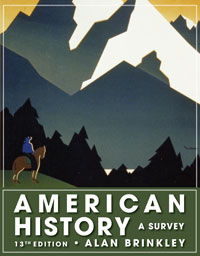American History: A Survey (Brinkley), 13th EditionChapter 27:
THE COLD WAR Main themes of Chapter Twenty-seven: - The origins of the Cold War in the mistrust between the United States and the Soviet Union amid the events of World War II
- The consequences of the Marshall Plan and the logic of containment in increasing United States involvement in crises around the world
- The nervous ambivalence that characterized postwar American culture in the Nuclear Age
- The origins and character of the Korean War
- The hysterical anticommunism that flourished in the first decade of the turbulent postwar era
A thorough study of Chapter Twenty-seven should enable the student to understand the following:- The extent of collaboration between the United States and the Soviet Union during World War II and the differences that developed between the two nations concerning the nature of the postwar world
- The meaning of the doctrine of containment and the specific programs that implemented this diplomatic strategy around the world
- The nature of Truman's Fair Deal—its successes and failures—and the challenge posed by the Election of 1948
- The working out of atomic tension in American culture, as evidenced by television, film noir, and comic books
- The circumstances that led to United States participation in a "limited" war in Korea
- The reaction of American public opinion to President Harry Truman's handling of the "police action" in Korea, including his firing of General Douglas MacArthur
- The nature and extent of American fears of internal communist subversion during the early Cold War years
- The historical controversies surrounding the origins of the Cold War
 | 




